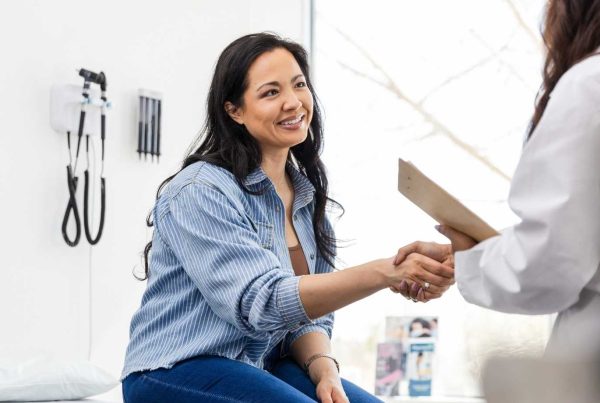While you may no longer need a yearly Pap smear, you should speak to your gynecologist about any pain, heavy bleeding or other complex gynecologic issues you may be having. Do this during your yearly OB/GYN appointment or sooner if you are experiencing issues. By speaking up, you may help your doctor diagnose endometriosis sooner. Call 216-778-444 to make an appointment.
Women are told from a young age that when it comes to periods, pain is something to expect. Cramps can be uncomfortable, of course, but extreme pelvic pain, whether during your period or while having sex, could be an indication of something more serious. “These are the symptoms I most typically see in patients with endometriosis,” said Robert R. Pollard, MD, a MetroHealth gynecologist and board certified specialist in female pelvic medicine and reconstructive surgery.
Other signs of the disorder may include heavy periods, trouble getting pregnant, bleeding between periods and problems with digestion such as diarrhea and bloating. Rather than suffering in silence, it’s important to discuss this kind of pain with your doctor.
What is Endometriosis?
About 7 million women in the United States have endometriosis, a condition in which the lining of the uterus, or the endometrium, grows where it should not. Endometrial tissue may be found on the outside of the uterus, the ovaries, fallopian tubes and the bowels, among other areas within the pelvis.
Delayed Diagnosis is a Problem
While the disease is relatively common, receiving a proper diagnosis is sometimes difficult. That’s because many of these symptoms are similar to uterine fibroids (noncancerous growths on the uterus), irritable bowel syndrome and pelvic inflammatory disease. Women are also sometimes hesitant to talk about their symptoms, while some doctors can overlook signs of the disease.
Another reason for a delay may be that endometriosis can only be definitively diagnosed with laparoscopic surgery, requiring a surgeon to insert a thin, lighted tube into the lower abdomen to view whether endometrial tissue has grown outside the uterus. Sometimes, patients put off having this procedure, said Dr. Pollard.
Effective Treatments are Available
While there isn’t a cure for endometriosis, a range of treatments are available to help women deal with symptoms.
Over-the-counter pain relievers: Non-steroidal anti-inflammatory inhibitors that you can pick up at the drug store can sometimes help with pain relief.
Birth control pills: If you’re not trying to get pregnant, doctors may prescribe extended-cycle birth control, in which you have only a few periods a year, or continuous-cycle birth control, in which you have no period. This can help reduce pain associated with menstruation and avoid heavy bleeding.
Lupron Depot®: An injection of hormones that causes temporary menopause and slows the growth of endometrial tissue.
Intrauterine device: This device is placed in the uterus and releases hormones that may help reduce pain and bleeding.
Physical Therapy: Pelvic floor exercises may help some women find relief from painful sex and pain during menstruation.
Surgery: If other treatments aren’t working, surgery may be an option. Some women need endometrial lesions removed from the ovaries, bowel and other pelvic organs. Others may choose surgery to remove the uterus (hysterectomy) and possibly the ovaries, fallopian tubes and/or cervix. Whatever the extent of the disease, “you want your condition addressed in one surgery,” said Dr. Pollard. “You don’t want to go back for repeat procedures.” Be sure to find a specialist who has experience in performing endometriosis surgery using laparoscopy, he said.
In addition to treating your endometriosis, you may need to work with fertility specialists if you want to have a family. “Fortunately, all the experts you may need to see to help manage your endometriosis are here at MetroHealth,” said Dr. Pollard.
While you may no longer need a yearly Pap smear, you should speak to your gynecologist about any pain, heavy bleeding or other complex gynecologic issues you may be having. Do this during your yearly OB/GYN appointment or sooner if you are experiencing issues. By speaking up, you may help your doctor diagnose endometriosis sooner. Call 216-778-444 to make an appointment.
Contributor:

Robert Pollard, MD
Gynecology











